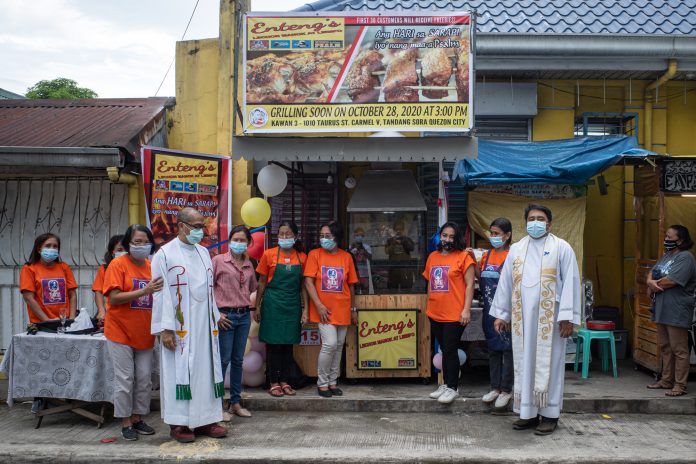A Catholic parish in the Philippine capital has launched a program to provide livelihood and easy access to food for the poor during the pandemic.
The Sanctuario de San Vicente de Paul Parish, which is run by the Congregation of the Missions in Quezon City, opened food stalls offering a variety of products from the provinces.
The program, dubbed Entengprenuers from the word “Enteng” for Vincent and entrepreneur, is managed by the parish’s office for Basic Ecclesial Communities.
On October 28, the parish inaugurated three stores in within the jurisdiction of the parish. It has earlier launched an online counterpart of the program.
Father Geowen Porcincula, CM, said the project is an improvement of the congregation’s response to the pandemic to assist Catholic communities emerge from the crisis.
The priest, who heads the COVID-19 response program of the congregation, said “the program is now geared toward a more sustainable way to aid communities.”
“It is basically a livelihood program but instead of individuals, the entire BEC is running it. It is a layer of creative pastoral response and has a dimension of social work,” he said.
Through the program, BEC members are not only helping themselves and the community by providing access to cheap and quality products but also help other sectors.
Lita Asis-Nero, BEC coordinator of the parish, said they buy their products directly from farmers in and sell these with “minimal profit.”
She said they sell rice from farmers affected by the low market price of unmilled grains and raw honey from the indigenous peoples.
As part of its charity program, the parish has hired eight homeless people as delivery personnel, providing them with bicycles and uniforms.
Community leader Marissa Tinao said they allocate 10 percent of the net income for charity. “Every week, we organize a community kitchen for children and the elderly in poor communities,” she said.
“The pandemic caught all of us unprepared. We do not want that to happen again, so we make sure that the BEC has money to support its members during the crisis,” she said.
“We’ve seen how the program is helping the community battle the impacts of the crisis without relying mainly on dole-outs,” said Father Porcincula.
The priest, however, said the primary goal of the program is not to profit but to develop “collaboration, trust, and commitment among community members.”









